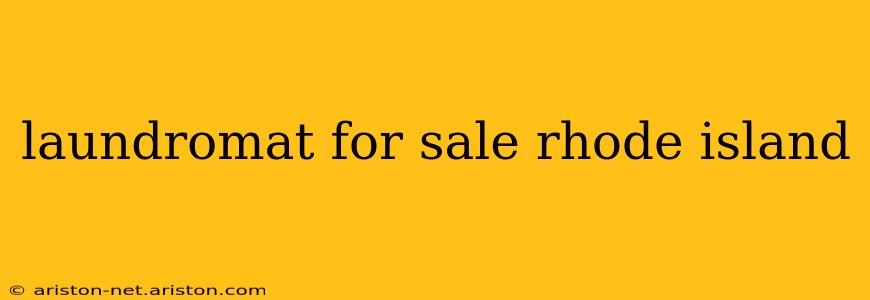Finding the right laundromat for sale in Rhode Island requires careful consideration and due diligence. This comprehensive guide will walk you through the key factors to consider, answer frequently asked questions, and help you navigate this exciting investment opportunity. Rhode Island's vibrant economy and diverse population offer a strong foundation for a successful laundromat business, but understanding the market is crucial for making a smart purchase.
What are the key factors to consider when buying a laundromat in Rhode Island?
Acquiring a laundromat isn't simply about purchasing equipment; it's about inheriting a business. Several crucial factors must be carefully evaluated:
-
Location, Location, Location: The success of a laundromat hinges significantly on its location. Consider factors like population density, proximity to residential areas, competition, visibility, and accessibility (parking, public transportation). A high-traffic area with ample parking is ideal. Is the location near college campuses, apartment complexes, or other high-density housing options? Rhode Island's varied demographics mean some locations may be better suited than others.
-
Financial Performance: Scrutinize the laundromat's financial records meticulously. Look beyond gross revenue and examine net profit margins, operating expenses (including utility costs—electricity is a major expense for laundromats!), and historical trends. Understanding the profitability and stability of the business is paramount. Request detailed financial statements for at least the past three years, and ideally, have a professional accountant review them.
-
Equipment Condition & Age: Assess the age and condition of all washing machines, dryers, and other equipment. Older machines might require frequent repairs, impacting profitability. Negotiate a price that reflects the equipment's condition and remaining lifespan. Consider the potential need for upgrades or replacements in the near future.
-
Lease Terms (if applicable): If the laundromat operates on leased property, thoroughly review the lease agreement. Pay close attention to the remaining lease term, renewal options, rent costs, and any restrictions or clauses. A favorable lease is essential for long-term success.
-
Customer Base & Reputation: A loyal customer base is a valuable asset. Investigate the laundromat's reputation within the community. Positive word-of-mouth and strong customer loyalty are positive indicators.
-
Competition: Analyze the competitive landscape. How many other laundromats are nearby? What are their strengths and weaknesses? A thorough competitive analysis will help you understand your potential market share and pricing strategies.
What are some common questions asked about buying a laundromat?
How much does a laundromat in Rhode Island typically cost?
The cost varies widely depending on factors such as size, location, equipment condition, and the laundromat's financial performance. Prices can range from tens of thousands to hundreds of thousands of dollars. Professional valuation is recommended to determine a fair market price.
What financing options are available for purchasing a laundromat?
Several financing options exist, including small business loans from banks and credit unions, SBA loans, and potentially seller financing. Your credit history and financial situation will significantly influence the available options and terms. Consult with financial advisors to explore the best financing solution for your specific circumstances.
What licenses and permits are required to operate a laundromat in Rhode Island?
Rhode Island has specific regulations for businesses, including laundromats. Contact the Rhode Island Department of Business Regulation to understand all necessary licenses and permits required for operation. This often includes business licenses, zoning permits, and potentially others depending on the specific nature of your operation.
What is the typical return on investment for a laundromat?
The ROI varies greatly depending on several factors, including location, management, and market conditions. Thorough market research and financial projections are crucial for estimating potential ROI. While laundromats can be profitable, they require diligent management and attention to detail.
What are the ongoing operational costs of a laundromat?
Ongoing costs include utilities (electricity, water, gas), maintenance and repairs, supplies (detergent, softener), insurance, marketing, and potentially employee wages (if applicable). Careful budgeting and cost management are essential for profitability.
Finding Your Perfect Fit: A Successful Acquisition
Finding the right laundromat for sale in Rhode Island requires thorough research, diligent due diligence, and a realistic understanding of the business's financial and operational aspects. By carefully considering the factors outlined above and addressing the frequently asked questions, potential buyers can significantly improve their chances of a successful acquisition and a profitable venture. Remember to consult with professionals – accountants, lawyers, and business advisors – throughout the process to ensure a smooth and informed transaction.
